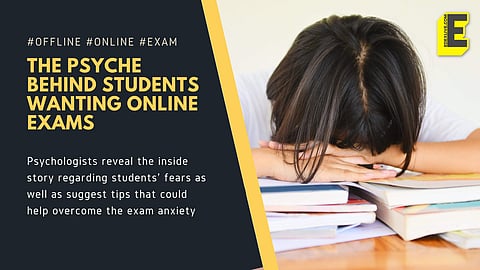

The online versus offline debate over exams is raging in academic institutions as exam fever has taken hold of students across the country. Homogeneity in the decisions made by authorities is something that is hardly seen now. Circumstances and context have taken hold of situations. But what cannot be denied is that academic standards have been hit hard. This is what EdexLive learnt when we spoke to two counselling psychologists who have had scores of interactions with students, parents and teachers. They provide the status quo with respect to the psyche of students and how they can be moulded back to pre-pandemic habits.
Online studies have pushed students into battery saving mode. The rigour of academics has gone down, according to counsellors. Alisha Lalljee, a consulting psychotherapist from Mumbai, says "Many students have taken exams and studies very lightly for the past two years. There hasn't been a lot of academic work done on their part. One student even narrated to me that they have six students gathering in a house and each searching for answers to a couple of questions and then all of them would copy them." Saras Bhaskar, a counselling psychologist based in Chennai, identifies the reason for students wishing for online exams as being used to online studies. "Two years of learning online has been a factor in making students lazy and inactive," she says.
The issue of using unfair means for exams online is also something that psychologists like Alisha are aware of. "Now even with the new rules in Mumbai stating that two cameras need to be switched on while writing the exam, students have found new ways to copy. Either someone not visible to the cameras would call out the answers or they would write answers on their legs which are not visible to the camera either," Alisha describes. Harming one's own body due to stress is also a marked worry among parents. "I have even had a student calling at night with suicidal thoughts over exam papers that he still needs to write. Attempts to harm one's own life have increased due to the colleges being firm on their decision to go back to offline mode," she narrates.
The psyche of students can be understood in the way the students are actually hoping for chaos in society. As Alisha mentions, "The students that I know were actually praying for the third and fourth waves of COVID-19 and they were visibly upset when it didn't happen. They felt that one more year could have been spent learning online. This is why the anxiety levels are soaring now in students."
When asked about how students can be eased into the normal academic routine of offline classes, the psychologists emphasise on smooth transition. "There needs to be an adequate balance now which would be good for both institutes and students. For instance, in some schools, written exams of three hours are now extended to four hours since the authorities acknowledge that students have lost touch with writing. If the students have become used to typing answers, then they can be asked to attempt online exams at the institutes rather than at their homes," says Alisha.
She specifies a method to help students gain their mojo back. "One way to cope is to go back two years and try to do one new thing every day that one used to do back during offline classes. This could be sticking notes, highlighting points or maintaining a book for pointers. There would be a definite change for the better if sustained for two weeks and beyond," she explains. Saras also identifies going back to routine as one key coping mechanism. "Students need to revisit and redefine their goals as they may have changed during the past two years. Besides, they must be open minded and flexible enough to change tracks of study if required," she explains.
Saras also enumerates various tips that help students deal with exam stress. "Firstly, one must self-identify that performance anxiety with respect to exams is natural. Usually, it is people who work hard who feel more anxious compared to those who work smart. It is essential that students read the instructions online as there is no invigilator to clarify their doubts. Additionally, they must also save the answers after answering each question since sometimes the system may fail and all marked answers may be lost. Students must keep a rough sheet handy to do calculations as their mental ability may be rusty and hence not fully reliable during the rush of the exam," she mentions.
Alisha also specifies the crucial role of parents in prepping children. She says "For parents, I ask them to ensure that their child is engaged in three to four hours of productive work every day. But to expect 12 or 15 hours of academic work is unreasonable and will not help. They should also ensure that there is no difficulty like bullying faced at school or college. Mood changes and friendships also need to be looked at to groom the children and not just gauge them through their report cards. Communication is key because I have seen students being defensive and snapping at their parents. In the end, they need to be made aware that parents also seek their betterment."
